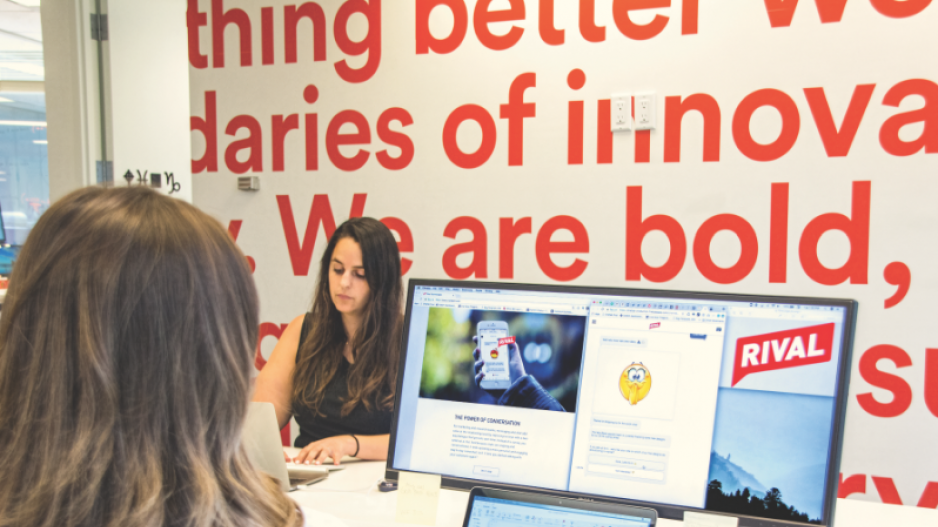If the market research industry has an Achilles heel, says Andrew Reid, it’s that consumers don’t want to fill out surveys.
“Yet you spend all this time on Instagram and on Snapchat and on Facebook [Nasdaq:FB],” said the CEO of market research start-up Rival Technologies.
Rival, which originally spun off from Vision Critical in 2016 following Reid’s departure from that company, is banking on chat, voice and video tools on mobile devices to fix a grasp on slippery consumers in a “phone-addicted world” that’s marked by apathy toward traditional data collection.
“Let’s build some data-collection tools that fit inside the applications that are on everyone’s phones or that simulate that functionality,” said Reid, who co-founded Vision Critical with father Angus Reid in 2000.
“And so with that the core thing that’s different is we’re making surveys conversational – surveys that will run inside Facebook Messenger, inside of other messaging apps and over the web.”
Rival has been developing these social-media-era tools to appeal to brands looking for instant feedback on events, products and services, partnering with the National Football League, Warner Bros. Entertainment Inc. and the Vancouver Canucks.
Instead of surveys, the tools take the form of artificial--intelligence-powered chatbots, conversations with voice assistants or video messages.
“If you run an event and you ask somebody two weeks later, ‘How was the event?’ the person can maybe tell you it was good or it was bad,” said Jennifer Reid, Rival’s chief methodologist and Andrew Reid’s sister. “They can’t really comment on the details of it. Whereas we can actually ask as the event is happening. So the insights are great.”
Like Vision Critical, the Reids are keeping the new venture a family affair.
Andrew Reid said he debated whether a sabbatical was in order after he left Vision Critical but decided that the timing wasn’t right.
“Sometimes it’s just good to keep your pulse on the network,” he said.
He ultimately took one week off before launching VC Labs, which rebranded as Rival Technologies under the Reid Campbell Group in June 2018. The Reid Campbell Group, which the Reids co-own, also oversees Chicago-based Reach3 Insights.
Andrew Reid had spent his last few years at Vision Critical running its innovation lab, which helped persuade him his next venture should focus on emerging technologies.
Jennifer Reid said she often hears from people who say they can’t imagine being in a business full time with a sibling.
But she said the two work well, with her brother’s entrepreneurial talents complementing her own analytical skills.
And the pair believes Rival is delivering on its promise.
Jennifer Reid said the survey response rate using traditional methods ranges from 12% to 25% but the tools developed by Rival have been able to capture an 80% to 85% rate.
“We definitely are able to reach the golden goose of the millennial male in a way that traditional research just can’t,” Jennifer Reid said, referring to a market segment of people born between the early 1980s and late 1990s that has proven particularly difficult to gauge.
“But it’s not that that’s the only group we’re getting,” she added.
A recent study on sunscreen delivered a group of respondents that was better distributed among different demographic groups than is typical for market surveys, she noted.
“If you can find the people, you’ve got the gold.”
Meanwhile, data from Branded Research indicates technology will likely be the most practical way to tap into those hard-to-reach demographics.
The company conducted its own survey on market research sentiment and found 76% of millennials (ages 22 to 38) were interested in participating in studies conducted through wearable devices such as an Apple Watch.
Nearly two-thirds (64%) of them said they would also like having the option of sharing photos when responding to questions rather than just text.
Rob Volpe, CEO of San Francisco-based consumer insights firm Ignite 360, told Business in Vancouver that social media outreach is changing how the business traditionally operates.
“That being said, nothing can still beat the depth and quality of an in-person conversation, particularly when it’s ethnographic and we can be in a person’s natural environment,” Volpe said. “You get to see how they live, hear the sounds in their home, notice the objects that decorate their life. It’s like the difference between seeing a lion in the zoo or on safari.”




